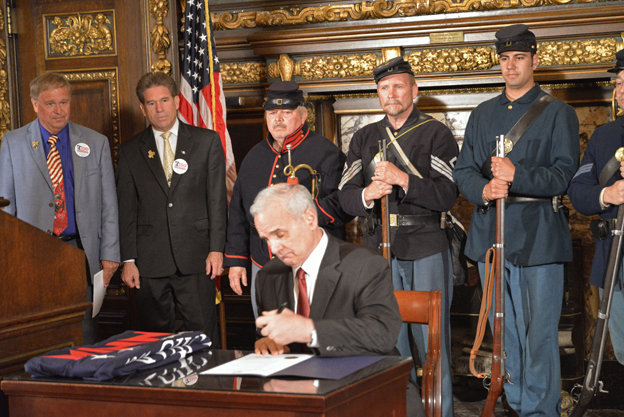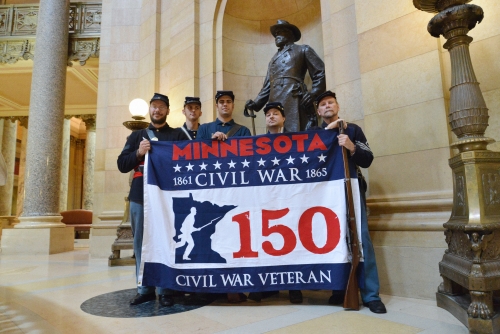

Repealing the Civil War
One Supreme Court decision at a time
July 2nd is the 150th anniversary of the heroic and historic action of the 1st Minnesota Infantry Regiment in holding the Union center and repulsing the confederates in a pivotal battle at Gettysburg in the Civil War. You can find out a lot more about the Minnesotans’ involvement in this battle and the entire Civil War at the the exhibit currently at the Minnesota History Center.
Here is the proclamation issued by Governor Dayton regarding the bravery of the Minnesota First on that day at Gettysburg:
Minnesota Courage at Gettysburg Recognition Day 2013 by Steve Timmer
In a weird juxtaposition of events, on the day that Governor Dayton signed the proclamation, the Supreme Court issued its ruling in Shelby County v. Holder, striking down Section 4 of the Voting Right Act of 1965; this section provided for federal oversight of voting regimes in former states of the confederacy, and a few other surprising places, too: Manhattan, Brooklyn, and the Bronx.
In addition to ending slavery, the war led to the adoption of the Reconstruction Amendments to the Constitution: the Thirteenth Amendment forbidding involuntary servitude, the Fourteenth Amendment, and the Fifteenth Amendment. The Fourteenth Amendment provides that all persons born in the United States, or naturalized, are citizens of the United States and of the state in which they reside, conferring citizenship on all the freed slaves; it also assures due process of law and equal protection to all “persons,” not just citizens.
In addition to the statement of citizenship, due process and equal protection rights in the Fourteenth Amendment, the Fifteenth Amendment provides:
-
- Section 1. The right of citizens of the United States to vote shall not be denied or abridged by the United States or by any State on account of race, color, or previous condition of servitude.
-
- Section 2. The Congress shall have power to enforce this article by appropriate legislation.
The Congress found, even a century after the Civil War, that many Jim Crow roadblocks to minority voting still existed. Exercising its authority under the Fifteenth Amendment, it adopted the Voting Rights Act of 1965, including the oversight provision of Section 4.
The states subject to federal jurisdiction chafed under it, of course, and some of them wasted no time in undertaking new efforts to suppress the vote once Shelby County was announced, including Texas, which began to implement a new voter ID requirement as soon the decision was announced. The Justice Department, which administers the Voting Rights Act, had prohibited the law from being enforced.
Update: Texas also adopted a new Congressional map that would have required Justice Department approval.
Further Update: Here’s a graf from an article in Salon discussing Justice Scalia’s thought process this last week; the article is mostly about the DOMA decision, but it does say something interesting about the judicial activism of the conservative wing of the court:
The case could be made [for Scalia’s position on DOMA] that this is sort of the only honest Originalist argument — there is nothing in the Constitution granting the Supreme Court the authority to determine the constitutionality of duly passed legislation, after all — but obviously this argument rather glaringly contradicts every single instance of Scalia voting to strike down a law. Indeed, it contradicts a decision the Supreme Court announced yesterday, in which the conservatives decided that a portion of the Voting Rights Act that they didn’t care for was unconstitutional because they didn’t care for it. But if Scalia wishes to recuse himself from all future cases involving constitutional questions, now that he has determined that Marbury v. Madison was improperly decided, I [Alex Pareene] am not inclined to stop him.
Here’s the flag that the governor and the State of Minnesota is sending to Gettysburg to commemorate the bravery of the First Minnesota Regiment, and its commander, William Colvill. That’s his statue in the Capitol.
Thanks for your feedback. If we like what you have to say, it may appear in a future post of reader reactions.


